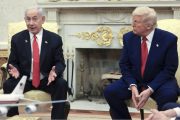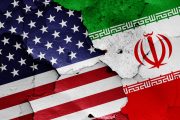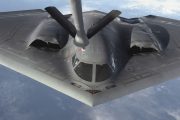
A report released by Amnesty International on December 7 says that ISIS has accumulated a large arsenal that includes U.S.-made weapons that the terrorist force has obtained from both the Iraqi army and Syrian rebel groups fighting against Bashar al-Assad.
An article about the report from CNN juxtaposed its findings with the U.S. strategy against ISIS outlined by President Obama in his Oval Office address to the nation on December 6. CNN first quoted Obama’s statement: “The strategy that we are using now — airstrikes, (U.S.) Special Forces and working with local forces who are fighting to regain control of their own country — that is how we’ll achieve a more sustainable victory.”
CNN then made the following observation:
These local forces will receive assistance in the form of weapons, backup via coalition airstrikes and training from U.S. special operations forces.
The Amnesty International report, however, concluded that it was these local forces that had inadvertently contributed arms to ISIS.
After quoting from Amnesty International’s findings that it had determined that a large proportion of ISIS’ current arsenal is made up of “weapons and equipment looted, captured or illicitly traded from poorly secured Iraqi military stocks,” CNN noted:
ISIS has also gained access to weapons from other sources through the capture or sale of Syrian military stocks supplied to armed opposition groups in Syria by countries including Turkey, the Gulf States and the U.S., according to the organization.
The flow of U.S.-supplied weapons from anti-Assad rebel groups to ISIS merely confirms what The New American has been reporting for some time — that— based on a U.S. intelligence report — the United States helped form and train ISIS from its beginnings.
This incredible policy was explored thoroughly in an article posted by The New American on May 26, “U.S. Intel: Obama Coalition Supported Islamic State in Syria.”
U.S. support for ISIS began as support for jihadists fighting against Syrian dictator Bashar al-Assad. In some respects, this was similar to the U.S. invasion that removed Saddam Hussein from power in Iraq, producing a power vacuum that ISIS would eventually fill across large areas of the country — virtually most of the country northwest of Baghdad to the Syrian border. Since ISIS has also made strong inroads into Syria, there is reason to believe that if Assad were to be removed from power, ISIS would also increase its presence in that nation, as well. Yet, that possibility has apparently not figured into U.S. strategy in the region.
The New American article by Alex Newman cited a 2012 Defense Intelligence Agency report, which was obtained in recent months by watchdog Judicial Watch via a Freedom of Information Act lawsuit, that showed that, “contrary to the false narrative peddled by the establishment press, the rise of the savage terror group known as ISIS was actually deliberate policy.”
The article quoted some very revealing information from the DIA report:
The West, Gulf countries [the Islamic regimes ruling Saudi Arabia, Qatar, United Arab Emirates, etc.], and Turkey support the Syrian opposition.
There is the possibility of establishing a declared or undeclared Salafist [fundamentalist Islam] principality in Eastern Syria (Hasaka and Der Zor), and this is exactly what the supporting powers to the opposition want, in order to isolate the Syrian regime.
The report explained, as The New American reported in the February 2012 article, “Al-Qaeda & the West Back Syrian Rebels Against Assad,” that al-Qaeda supported the Syrian uprising from the beginning as well.
As we noted in our article last August, the DIA report exposed the lies propagated by the Obama administration, senior U.S. lawmakers, and foreign leaders to convince Americans that the U.S. government should support non-existent “moderate” rebels in Syria. According to the classified document, U.S. authorities were well aware of the fact that the rebellion against Assad was being led by radical jihadists — including many of the same forces that the U.S. government was supposedly fighting against in the terror war.
Notice the contrast between the conclusion of the Amnesty International report, as cited by CNN, “that it was these local forces that had inadvertently contributed arms to ISIS,” and the 2012 Defense Intelligence Agency report cited by The New American noting that, “contrary to the false narrative peddled by the establishment press, the rise of the savage terror group known as ISIS was actually deliberate policy.” (Emphasis added.)
As significant as the transfer of arms from the U.S.-backed rebels to ISIS is, Amnesty International noted in its report that even more armaments originated with supplies that ISIS captured from the Iraqi army, which was prone to retreat in the face of advances by the terrorist forces. When ISIS insurgents seized control of the western half of Mosul, Iraq, in June 2014, we reported that the Iraqi security forces, who outnumbered the ISIS fighters by more than 15 to one, suffered what a BBC reporter described as “a dramatic collapse of morale.” Following such retreats by Iraqi forces, ISIS simply had to gather the weapons that the fleeing soldiers left behind. An article about the Amnesty report in Mother Jones on December 11 noted:
When ISIS captured the Iraqi city of Mosul last summer, it also nabbed a bonanza of weapons, ammunition, and vehicles from the fleeing Iraqi army. The Islamic’s State’s embarrassing seizure of military gear ranging from American M-16s to armored Humvees made headlines around the world.
Mother Jones quoted a statement from Patrick Wilcken, a London-based arms control researcher and author of the Amnesty report, who said: “That very spectacular looting in 2014 … was just the endpoint of a very long history of hemorrhaging of supplies that started in 2003 [the year that U.S. forces invaded Iraq and deposed Saddam Hussein].”
The report’s summary noted: “The quantity and range of [ISIS] stocks of arms and ammunition ultimately reflect decades of irresponsible arms transfers to Iraq and multiple failures by the US-led occupation administration to manage arm deliveries and stocks securely.”
What should be obvious from all of this is that if the United States had not invaded Iraq and removed Saddam, turning control of the country over to a series of dysfunctional governments, it is highly unlikely that ISIS would have overrun so much of Iraq and captured so many weapons supplied by the United States and other countries. Also, ISIS could have acquired U.S.-supplied weapons from the rebels fighting against Assad in Syria if the United States had not sent arms to those insurgents.
Former representative Ron Paul (R-Texas) and his son, Sen. Rand Paul (R-Ky.) have made numerous statements critical of U.S. interventionism in the Middle East, and the younger Paul wrote an article published by Politico in 2013 explaining why the United States should not send aid to the rebels in Syria, stating:
Americans would probably be surprised to learn that their government was arming affiliates of Al Qaeda. But this is essentially what President Barack Obama is about to do.
Now, another presidential candidate, Senator Ted Cruz (R-Texas), has raised eyebrows in some quarters by taking a non-interventionist position, stating that he Middle East was better off before the United States helped depose Saddam Hussein and Moammar Gadhafi in Libya.
Speaking on MSNBC’s Morning Joe program, on December 10, Cruz replied to host Joe Scarborough’s question asking if the Middle East had been more secure when Hussein and Gadhafi were in power and Syrian President Bashar Assad was not fighting against the rebels in Syria.
“Of course it was,” Cruz said. “That’s not even a close call.”
Cruz continued:
My view, instead of getting in the middle of a civil war in Syria, where we don’t have a dog in the fight, our focus should be on killing ISIS. Why? Because ISIS has declared war on America. They’re waging jihad.
This rise of ISIS, and its growth from a rag-tag group of jihadists into a major threat to the security of the Middle East, can easily be attributed to our interventionist, disruptive foreign policy, as both Pauls have long warned us and Cruz has just reminded us.
Related articles:
ISIS: The Best Terror Threat U.S. Tax Money Can Buy
Globalists Using Muslim Terrorists as Pawns
U.S. Bombs 41 $250,000 Humvees Captured by ISIS
British SAS Forces in Syria Disguise Themselves as ISIS Fighters
Top Syrian Rebel Group Merges With Al-Qaeda in Iraq
Obama’s “Anti-ISIS” Coalition Built ISIS, Biden Admits
Obama and UN Created Terror State in Libya
Benghazi Report Ignores WH Lies, Obama Gunrunning to Jihadists
Christian Massacres: A Result of U.S. Foreign Policy
Obama Helped ISIS in Syria, Now Fights It in Iraq
ISIS Seized $1 Billion of U.S. Military Aid, Iraqi Leader Admits
U.S. Intel: Obama Coalition Supported Islamic State in Syria
The War on Terror Is Creating More Terror
The Disasters That U.S. Intervention Created




